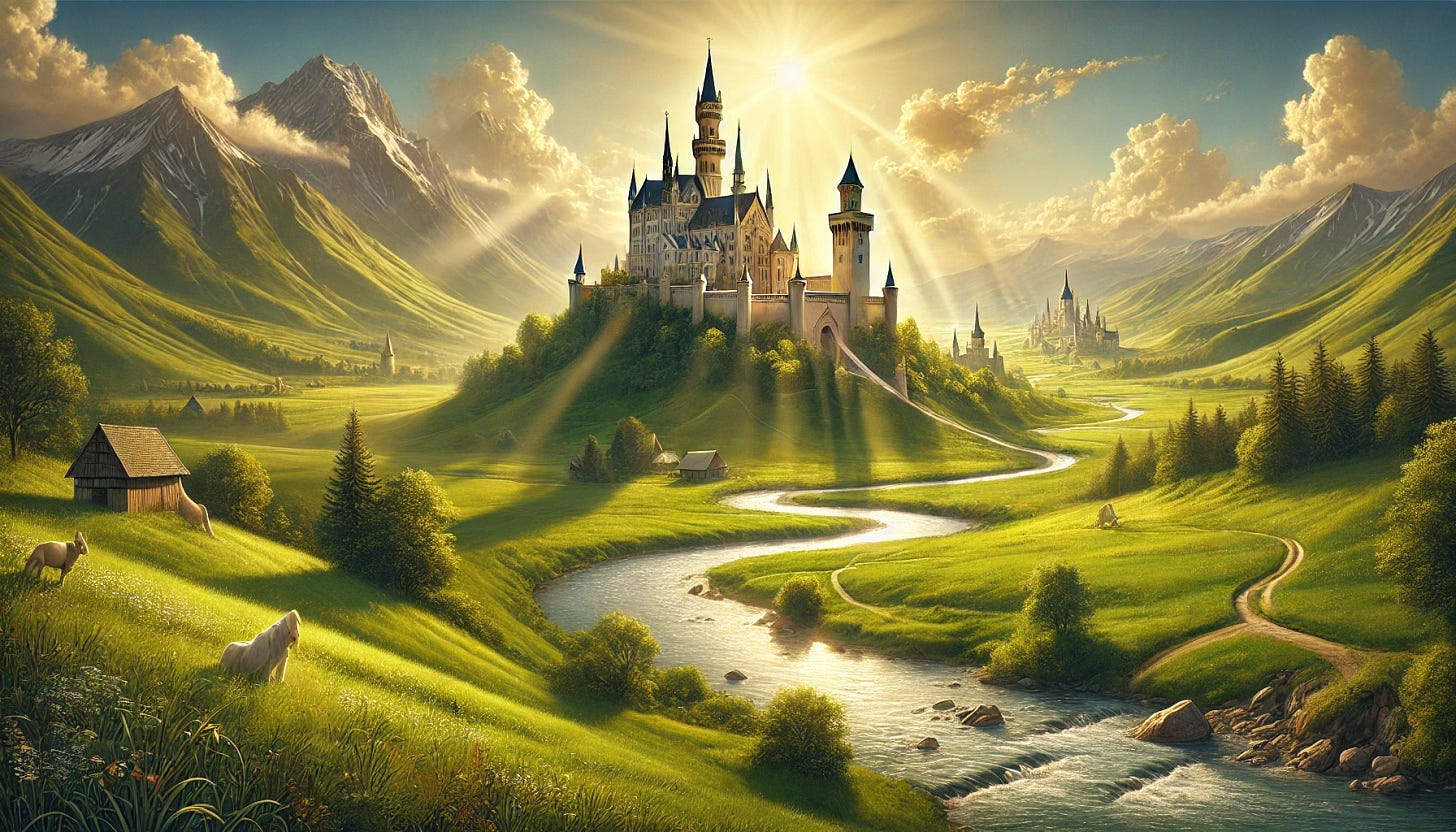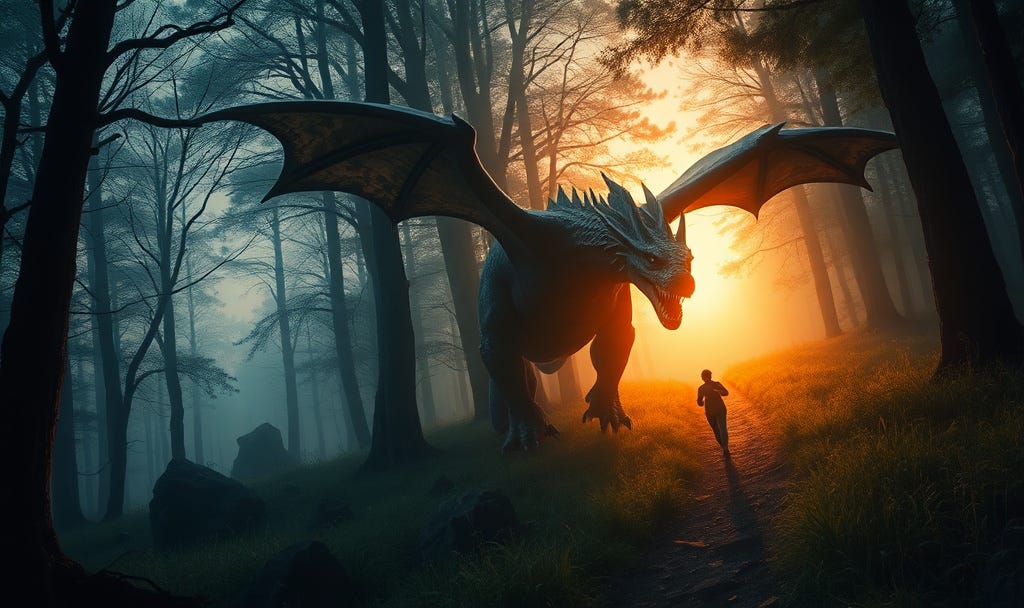Introduction - Journey to Christendom (Third Edition)
The background to my spiritual journey through the castle gateway of Catholicism
I did not know that growing up as a Christian-thinking, mainstream young man in Oklahoma during the 1960s and 1970s would lead me to live a life so different from modern American culture. But that is exactly what happened, and I am writing to share how it all came about. I believe that modern culture has shifted significantly since the 1960s, moving away from a once Christian-oriented society. As a youth, it never crossed my mind that my country and its civilization would so swiftly embrace a more pagan culture that prevails today.
While modern society moved towards paganism, I turned in the opposite direction, embracing Roman Catholicism, a religion often misunderstood by the secular world. Saints drew me to it—heavenly friends outside of my childhood circle, outside of time and space. They led me to a peaceful freedom, wholeness of faith, true reason, and the unity of Catholic tradition. They opened a gateway to a new spiritual realm, one rooted in the ancient Christendom of the Middle Ages. My journey to the uplifting highlands and clear air of Christendom, through the completeness of Catholic faith, reason, and tradition, is the essence of my book.
If modern culture leaves you feeling physically, mentally, and spiritually unfulfilled with its lifestyles, or if its superficial spiritual solutions or nihilistic philosophies unsettle you, this book is for you. Even if you enjoy modern culture, you might still find value in this book, though it may challenge your views. As G. K. Chesterton said, “A dead thing can go with the stream, but only a living thing can go against it.”[1]
I can describe my situation in the same spirit, but differently from Mr. Chesterton’s analogy. At a crucial point in my life, I found the Faith as a rock that does not move—a rock two thousand years old, whose foundation predates the physical universe. This rock is solid. I clung to this rock like a drowning man in a turbulent sea. The joy and freedom of discovering the rock of truth amidst the storm of modern thinking is my thesis.
I wrote this story from the heart. If everyone has a story that could benefit at least one other person, this writing represents my story. It is the outcome of my spiritual journey through the lifesaving world of the Dogma, Creeds, Traditions, and Scriptures of the two-thousand-year-old Roman Catholic Church. To some, these words may sound like sweet music; to others, like nails on a chalkboard; and to still others, like a chaotic mix of thoughts.
Though my language may sound subjective, the spiritual journey I discuss is one of objective certainty. The life of the Church is authentic and available to everyone, even though my description is based on personal experience. This is crucial. The joy, freedom, and grace I speak of are not because of any special merit of mine. I am an average person with no fundamental worldly importance. This means everyone can and should take this journey. If you think this story is about a unique, subjective experience, only mine, you’ve missed the point. I hope you follow the same path, discovering your own personal possibilities based on shared, objective truth. We can achieve unity through objective truth and grow into the individuals God intended us to be by following the path of the dogmatic Roman Catholic Church. It is glorious! Only God could conceive and found it this way; I will show you he did.
Imagine traveling with someone on the same road. Objectively, it’s the same path, though each of you may describe the trip differently based on your experiences. This is important to remember while reading this book, as many today view everything subjectively and deny an objectively true path for the world. No one is supposed to say there is objective truth, a truth that speaks dogmatically about right and wrong, and how to get to heaven and avoid hell. Yet, Jesus Christ, through the Scriptures, Sacred Traditions, and the Magisterial teaching authority of his two-thousand-year-old Church, tells us there is such a path. It is true and solid ground.
My journey has been on this glorious path of Catholic Dogma, handed down directly and completely from the original apostles. It is the only road valid reason leads to, traveled with freedom and joy by countless others before us. By God’s will, all people are meant to cross it, for it is the way to our ultimate destiny, beyond the suffering material world. God opened this road for us, willing us to travel it. He is a Father who wishes all his children to find their way out of the wilderness. He has given us his only Son to lead us.
It is saddening that many do not choose to follow this path, preferring to reject the will of the Good God. They have the freedom to make that choice. The very freedom that atheists, New Agers, and secularists seek is already given by God, though they rarely realize it. God has given humanity the radical freedom to accept or reject him. It is unfortunate that more do not use that freedom to obey rather than disobey. Free obedience to God makes eternal beatitude an objective reality. This we know by God’s promise. Rejecting God for an inauthentic, godless freedom ultimately enslaves humanity, an objective reality I know well!
Jesus Christ, the only Son of God, opened this path by allowing himself to be crucified by non-believers without resistance. Despite having the power to prevent it, he chose not to, so we might travel this path of freedom with him. He rose from the dead in real terms, witnessed by many. He established the Roman Catholic Church as his body on earth so that he could walk visibly with humanity in every generation until all willing to accept the way are brought home.
He desires everyone to accept it. Therefore, we must share this gospel, despite opposition from a superficial, godless humanism that speaks of universal love but shows indifference toward God and those who follow him. As G. K. Chesterton noted, “There are those who hate Christianity, and call their hatred an all-embracing love for all religions.”[2] Our Lord also asked what good it would be for a man to gain the entire world but lose his soul.[3] Any humanism that rejects Christ is not lasting; it is superficial. Christ rose from the dead; no other did. Should we not pay attention to him? What rational person could reject a resurrected Christ? What godless humanism makes sense considering the resurrection? Think about that; if you are truly reasonable, you will grasp the primary message: Christ is the objective reality! He is life!
Some might argue that organized religion is dangerous, causing many conflicts. But religion involves the eternal destiny of our souls, something worth fighting for. It is more rational to fight for our faith than our country. Our ancestors knew this. Tell me to abandon my Catholic faith for atheism or a one-world spirituality, and I am prepared to fight. I want to go to heaven and will let nothing deter me. I agree with G. K. Chesterton that religious conviction, though sometimes leading to conflict, is more rational than patriotic fervor:
“The Crusade was a religious movement, but it was also a perfectly rational movement; one might almost say a rationalist movement...But it certainly is the fact that religious war is in itself much more rational than patriotic war. I for one have often defended and even encouraged patriotic war and should always be ready to defend and encourage patriotic passion. But it cannot be denied that there is more of mere passion, of mere preference and prejudice, in short of mere personal accident, in fighting another nation than in fighting another faith. The Crusader is in every sense more rational than the modern conscript or professional soldier. He is more rational in his object, which is the intelligent and intelligible object of conversion; where the modern militarist has an object much more confused by momentary vanity and one-sided satisfaction.”[4]
Religion deals with both the here and the hereafter. I will try to share my faith out of love, even in difficult circumstances. It is love that drives the Catholic faith, not conflict. We choose to follow our faith out of love, and I will explain that in this book.
In discussing my path to freedom, I present an alternative to the deterministic worldview that can feel oppressive today. The Western world, significantly influenced by atheism and Eastern spirituality, has lost its traditional Catholic base. We are so entrenched in relativistic morality that we sometimes look to non-Christian philosophies for guidance about Christ. This spiritual disorientation shows how far we have strayed.
The modern mind often attempts to see beyond objective morality. Eastern thinkers who write about Christ as if he were a Hindu or Buddhist are spreading confusion, not clarity. They have no authority to teach about Christ. The authority to teach Christ rests in the Church he founded, which has preserved the Faith for over two thousand years.
“In order that the full and living Gospel might always be preserved in the Church the apostles left Bishops as their successors. They gave them ‘their own position of teaching authority.”[5]
“The task of giving an authentic interpretation of the Word of God, whether in its written form or in the form of Tradition, has been entrusted to the living, teaching office of the Church alone. Its authority in this matter is exercised in the name of Jesus Christ. This means that the task of interpretation has been entrusted to the bishops in communion with the successor of Peter, the Bishop of Rome.”[6]
To say an Eastern thinker has no authority to teach about Christ might be difficult for the modern mind, influenced by subjective, non-judgmental thought. This was not the case for the first one thousand five hundred years of Christianity. If God seems distant, who moved? It wasn’t the Roman Catholic Church, which maintained apostolic succession from Christ and held the authority to teach the apostolic message.
My desire to write this journey is driven by a love for humanity and a desire to share the truth. My words may be challenging for some to accept, like addressing a serious issue with someone we care about. Offering a positive alternative is essential. Regular participation in the sacraments, prayer, better education in the Faith, and the practice of virtue will bring health back to the soul, mind, and body. These are the alternatives the Roman Catholic Church offered for over two thousand years. Saving souls is genuine love. Jesus Christ saved us; no philosophy or ideology can do that. Sometimes, clear and direct communication is necessary to convey this truth. And direct communication out of love is my aim.
I hope those who read this book will join me in joyfully embracing this path to freedom. I call it The Freedom Dance, inspired by those who led me to it with their own joyful steps. This vision of dancing joyfully on a path of Catholic Dogma challenges the modern mind, which often seeks solutions in therapy or medication. The sacrament of confession offers absolution and healing, something therapy alone cannot provide. Yet, we are called silly for joyfully following this path. I pray others will join us on this journey.
I care only that nothing in this writing opposes the teachings of the Holy Mother Church. I desire to please Our Lord and Our Lady, to be in union with the Pope and the magisterial teachings of the Church. I care nothing for any man’s opinion, except Jesus Christ, the Son of God, who died on the Cross for the world’s redemption. He, the Founder of the Roman Catholic Church, created all things, and there is no other. It will be to him that all powers on earth will kneel. “Then he will judge between the nations and arbitrate between many peoples.” He is the mediator with the Father in heaven, and there is no other. Finally, I desire to please the Mother of Our Lord, who brought me from darkness into the light of her Son.
[1] G.K. Chesterton, Everlasting Man, 1925, http://chesterton.org/discover/quotations.html (December 2008)
[2] G.K. Chesterton, ILN, 1/13/06, http://chesterton.org/acs/quotes.htm#Religion%20and%20Faith (December 2008)
[3] Mark 8:36
[4] G.K. Chesterton, “The Meaning of the Crusade”, 1920, http://chesterton.org/gkc/historian/crusade.html (December 2008)
[5] Catechism of the Catholic Church, paragraph 77.
[6] Catechism of the Catholic Church, paragraph 85.
[7] Isaiah 2:4




